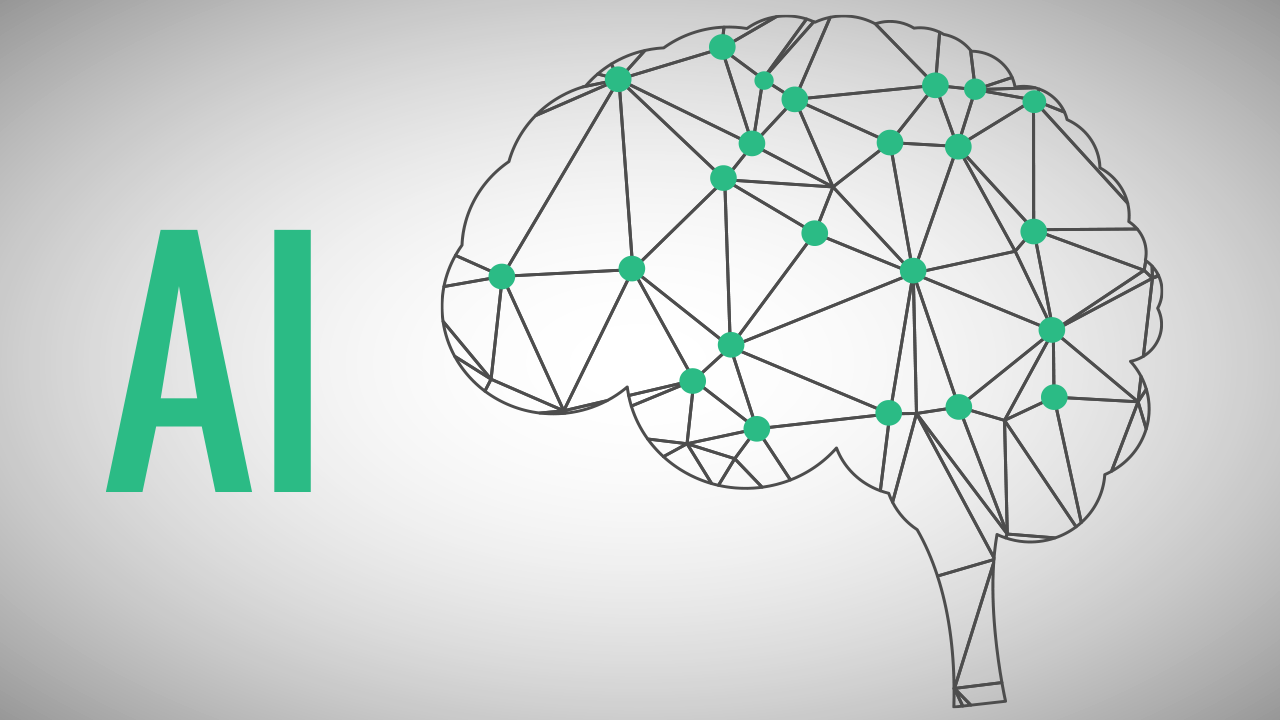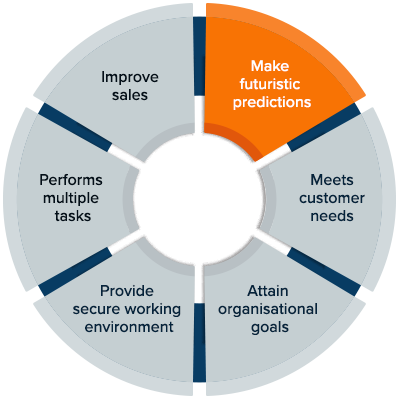
AI in Digital Marketing Explained – Benefits, Features, and Digital Security
Technology is rapidly growing at every moment. The marketing field has undergone a drastic change due to the introduction of artificial intelligence.
Artificial Intelligence based digital marketing delivers improved customer experiences, thereby uplifting the company’s fame. It includes understanding the customer needs, delivering product content to the targeted customer, and managing the entire process. Artificial Intelligence in Search Engine Optimization provides relevant content for the customer which improves user experience. This is an effective marketing strategy to improve sales. It also proves to be an effective tool in data security and cyber-security. It easily identifies the threat and malware to provide a safer working environment. In this article, the future of Artificial intelligence in digital marketing is discussed.
Artificial Intelligence
The design of smart machines performing typical tasks that require human intelligence is called artificial intelligence. It works on data that are fed and gathered during the process. The decision-making is completely data-driven that analyzes past and present data to provide an effective futuristic solution. It does not require human intervention. Artificial Intelligence is used by companies to improve their process efficiencies, automate resource-heavy tasks, and make business predictions. Examples of Artificial Intelligence are expert systems, natural language processing, speech recognition, and machine vision.
AI systems require specialized hardware and software for analyzing and processing data. Al system processes millions of data. The input data is analyzed for correlations and patterns. These patterns are used to make predictions about the future.
The processes of Artificial Intelligence include three cognitive skills. They are learning, reasoning and self-correction.
Learning Processes
AI programming acquires data from all possible resources. These data are useful in creating rules to perform a valuable task. These rules otherwise called an algorithm, provide step-by-step instruction to the systems to perform the required tasks.
Example: The marketing websites provide customized recommendations to the customers based upon the search history.
Reasoning Process
Artificial Intelligence systems select the desired algorithm to perform required tasks at the right time. The field of marketing requires quick and effective solutions to both the organization and the customers. The AI system runs 24×7 customer service to provide necessary solutions to all customer queries. This system also manages system traffic, protects the network from threats and attacks, and manages the organization’s processes.
Self-Correction Process
This data-driven AI system improves itself by processing a large volume of data. It updates its functionality based on the nature of data providing effective functioning of the systems. It predicts the future instance and works accordingly to manage the system. In digital marketing, Al systems target the customer with the right deals which makes them undeniable in buying the products. It suggests the products that are suitable for the special occasions which make the customer satisfy their needs.
Artificial Intelligence in Digital Marketing
Digital Marketing is the practice of promoting brands to potential customers through the internet and other forms of digital communication. It includes advertising content, capturing potential customers’ interest, and selling their products. The introduction of Artificial Intelligence in Digital marketing helps the marketer to identify the customer needs and satisfy them with the required products. Artificial Intelligence is data-driven. It learns from data and provides an effective solution without human intervention. This also helps the marketer to function more effectively with the predictions made by the Artificial Intelligence systems. It works effectively which eases the work of the marketer and improves sales without many humanitarian efforts.
The Function of Artificial Intelligence in Digital marketing
The basic principle of Artificial Intelligence in Digital marketing is that automating the process of learning and decision-making to create knowledge that improves performance. Artificial Intelligence runs thousands of tools and applications to perform simple tasks and to suggest predictions. It researches the existing data to provide the desired outcome to the organization. It is capable of performing multiple tasks like managing the organization functions, delivering the service to the customers, and securing the entire work process. It helps the organization to drive relevant traffic and protect the systems from threats which provide a secure working environment. It acquires new customers, increases sales, and retains the existing customers by understanding the thoughts of the buyers. It does not require any additional features or tools to perform the tasks. It begins to work with the programmed features and updates itself to the existing work conditions.
Benefits of Artificial Intelligence in Digital Marketing
Work Efficiency
- Data-Driven Analysis of Artificial Intelligence makes efficient futuristic predictions to set marketing strategy.
- It is error-free and gives efficient results to attain organizational goals.
Improve Marketer and Customer Relationship
- It answers the customer’s queries and provide better customer experience.
- It provides relevant product content to the customer. Thus, improving better relationship between the marketer and the customer.
Adaptability
- Progressive machine learning algorithms helps to adapt to new inputs for effective functioning.
- The capabilities of devices like GPS tracker, voice assistants can be added with its smart algorithms to enhance the quality of service.
Automation
- Business processes are automated to provide a personalize service delivery and business-specific insights.
- It saves time and resources of the brands and marketers.
Higher Productivity
- Repetitive tasks are automated using AI algorithms that require less time in delivering the results.
- The quick delivery of results helps to improve the productivity.
Improved Customer Experiences
- Artificial Intelligence is used to create strategies that takes products to the right audience with undeniable deals.
- It understands the needs and preferences of the customers to deliver a customized users experience.
Features of Artificial Intelligence in Digital Marketing
The features of Artificial Intelligence in Digital marketing help both suppliers and buyers. It reduces the workload of the marketer. It improves the customer shopping experiences. AI algorithms work to ensure better results faster and accurately to provide a better user experience to both marketer and the customer.
In this highly competitive world, implementing the right strategy is very important in capturing the market. Human-based solutions require continuous experimenting, analysis, and predictions. This takes more time and resources. Artificial Intelligence lessens the marketer’s workload. It delivers valuable insights into the business solution by analyzing a large amount of data. It provides accurate and efficient results in less time. It develops the strategy for implementation and sends it to various levels of organization for implementation.
The predictive analysis tools gather data from all possible sites analyze it and produce an effective solution. It allows greater performance with futuristic goals.
Customer-driven Features
Chatbots
Chatbots are Artificial Intelligence-based Customer Care which provides customer service. It answers the frequently asked questions of the customer. It also directs the customer to the human service personnel if required. The service personnel gets more time to deal with critical queries to enhance customer service. The customers are directly connected to the virtual assistant to answer their queries without any delay.
The organization can respond to customer queries at any time of the day. It also reduced the workload of the organization and expenses to hire customer service personnel for constant workflow.
Chatbots are cost-effective. It deals with customers more efficiently than human personnel. It helps to improve customer service by being polite, engaging, and likable to the customer.
Customized Product Recommendations
AI-driven Recommendations to customers is an effective marketing strategy. This helps the organization to communicate to the customer at an individual level rather than relying on the generic target groups. The artificial intelligence-based data analyst tools are used to collect data about customers’ interests, preferences, habits, buying behavior, and needs. These data are collected from past search history, likes, purchased products, social media interactions, etc. These insights are used to provide customers with personalized recommendations which they cannot resist purchasing.
Artificial Intelligence-based recommendations help the customer to engage with the brands, improve customer experiences, and thereby increase the sales of the products. The analysis is accurate and quick. This is helpful in targeting the right customer at the right time with the perfect deals.
Better Shopping Experience
Artificial Intelligence in Digital Marketing has tremendously changed the way of shopping. Initially, the customers buy products by viewing the images and videos of the products. The marketers are experimenting with different versions of Artificial Intelligence to provide a new experience of shopping to the customers.
The consumer can search for the product in their own language. It is a prominent method in attracting all customers. The customers can also able be to track the shops and products available in their nearby location. It serves easy for the customers in receiving products on time.
AI Technology created virtual fitting rooms for any store. This allows customers to try products by simply standing in front of a screen and camera. It shows how the product looks for the customer without much effort. The virtual platforms are created using AI algorithms to promote a product in the way it looks in real-time to attract offline customers to online buyers.
AI analyst tools collect the pricing details of the product of interest from different sites to the customers. This accelerates the sale of the product and provides better customer satisfaction.
Marketer-driven Features
Promotion of Advertisement
Advertisement plays an important role in the successful launch of any product. Artificial Intelligence based digital marketing helps the marketers with the predicted results of the customer intentions. This helps them to launch new products, exciting deals and offers at the right time to capture potential customers.
Traditional marketing strategy requires more human efforts to deliver the right advertisement to customers. This has utterly failed due to human errors. The AI-driven approach works on predictions. It provides valuable content to be published in the required channel of interest that improves sales. It is accurate and quick in reaching the targeted customers.
Artificial Intelligence algorithms independently decide the how, what, when to promote the product to attract buyers. The personalized recommendations, emails, notifications are used to advertise the deals and offers. AI-based advertising proves to be the most effective tool in digital marketing.
Content Marketing
Content marketing proves to be a prominent strategy of digital marketing. It helps the customer to engage with the brands by creating relevant content of the products and delivering it to the target customers. The content includes relevant articles, videos, podcasts, etc. Content marketing provides a better return on investment to the organization.
Content marketing includes content creation and content curation.
- Content Creation
Artificial Intelligence content creation is the creation of content by the machine. The AI software generates valuable content insights by the parameters and descriptions provided by the marketer. The content is created within seconds that provides the quick delivery of content. Content creation requires more time for human professionals than AI-based software.
- Content Curation
Content Curation is the process of creating customer-driven content by researching from various resources. AI software provides effective curated content. It is helpful in enhancing the brand-customer relationship, uplifts the market of the product, and helps the brand to build trust with the customers.
Business Intelligence
Business Intelligence is technology-driven data extraction process. It collects relevant data from all possible resources that are helpful in decision- making process for marketing and sales. The data insights guide the management in marketing processes. The marketing processes include
- Realizing the customer preferences
The main goal of marketing is to understand customer needs and to provide customer satisfaction. Business intelligence gathers customer behavior from all possible channels like social media, search history, etc. Artificial Intelligence-based marketing tools constantly monitor the channel of interest and extract the data and send it to the marketer.
- Creating marketing trends
Marketing trends change according to the buying pattern of the customer. These patterns are helpful in understanding the customer insights about products. This trend-setting process uses valuable content to make more customer engagement with the organization.
- Rapid processing and quality insights
The data is extracted from many sources. The decision-making process can be time-consuming if done manually. AI-driven technology helps to rapidly extract data helping in a quick decision process.
- Measure the success rate of marketing efforts on various channels
The data in Business Intelligence are visualized to track the progress of the implemented marketing strategy. It is helpful for the organization in updating and renovating the strategy to capture the market.
AI tools also help the marketer to frame trends based upon the customer’s needs and preferences. The promotion, deals, offers, and insights are recommended to the marketer based on the research. This works to be an effective strategy of digital marketing.
Process Automation
Artificial Intelligence automates all levels of marketing processes. This reduces the burden of the marketer. Artificial Intelligence systems take care of complex and repetitive processes. The repetitive process requires continuous monitoring. Human intervention may lead to errors. The AI systems work accurately on repetitive tasks. The majority of the marketer’s task has been done by the AI systems. It saves the time and resources of the marketer. Thus, it helps him to concentrate on creating effective strategies when the machine fails.
The Automation of the marketing process increases the productivity of the organization. It analyzes the customer’s behavior and creates better content. It implements strategies to improve customer experiences and improve sales of the product.
Search Engine Optimization
Search Engine Optimization is a process of delivering the most relevant content site to the user’s search queries. It is a practice that is designed to improve the appearance and positioning of web pages in search results. An efficient SEO strategy is important for improving the quality and quantity of traffic of the website. The more the traffic signifies that the content of the website is most relevant to the user’s search query. In digital marketing, high-quality traffic means that the visitor is interested in the products, information, or other resources of the marketer’s site. As the number of users on the site increases, the website is most likely to appear top of the page that helps to attract more visitors.
SEO gathers information about all the content they find on the internet. It begins its search from the internal links present within the sites to the external links that connect to other sites. It understands each page about the correlation with the other pages within the search engine’s massive database.
The inclusion of Artificial Intelligence in Search Engine Optimization has improved the search experience of the user. A traditional typing process is refreshed where the AI Algorithms provide the relevant content result to misspelled search queries. Additional search features like voice search, image search, and visual recognition are added to improve search results. The AI algorithms abstract the keywords from the speech to provide the relevant site content.
It also inspects content for truthfulness, thus neglecting the fake, spam, and junk content. This also avoids duplication of content and outdated content which improves the user’s experience. It ranks the product content based on reviews, popularity, likes, and buyers. Thus, it saves the user time.
Artificial Intelligence in Security
Security plays an important role in any enterprise. Business security is very important to secure critical data and the entire business network from vulnerabilities. Artificial Intelligence is used to build a strong security infrastructure. It is essential for data security, as this technology processes millions of data sets, analyzing, and detecting a variety of cyber threats.
It continually learns from the existing data and past experiences to detect the attacks and stop them with ease.
Benefits of AI in Data Security and Cyber-security
Threat Detection
Hackers follow different trends, different technology to perform attacks on the system. The employees cannot identify all the threats entering the network. The AI-based cyber security system has up-to-date knowledge of all the specific threats. This helps them to make important decisions to prevent the attack as well as to protect the organization from future attacks.
Securing Authentication
The process of verifying the identity of the user or process is called authentication. Secure authentication is required to protect the critical process and data from attacks. AI system learns the different access levels of the personnel, monitors the process of accessing valuable data by the professionals. The unauthorized access or trial of entry of unauthorized requests is neglected immediately by the AI systems. The alert is given to the technical personnel.
Malware Prevention
Software that is designed to damage the business network and devices like computers, servers, etc. is called Malware. The technical personnel may be unaware of the malware present in the network. Human error and negligence cause a threat to security. AI systems easily detect the malware and delete it from the entire system.
Data Breach Prediction
Data Breach is the process of accessing valuable and sensitive data by an unauthorized party. Data Breach is considered to be the most critical threat to the organization.
AI systems handle lots of data. The data include customer personal details to organizational asset inventory which has a detailed record of all devices, users, and applications. AI systems understand the different levels of access to various datasets.
The predictive analysis of the system identifies the abnormalities based on the existing data and moves the critical content to the safer source. It also monitors the system, prevents attack, and provide data security.
Endpoint Protection
AI has an important role in securing the devices used for remote work by the organization. The anti-virus solutions installed in those devices can detect remote malware and ransomware attacks. To protect the system from the latest threats, AI-driven endpoint protection establishes a baseline of behavior through repeated training. When it detects any threats in the device, it sends a notification to a technician, or it involves itself to bring back the device to a secure state.
Security Management
AI system provides a faster response to the alerts and removes the root cause of the threat. It can improve network security over time. It uses machine learning and deep learning to learn the processes of business network behavior. It recognizes the patterns on the networks and takes security measures if any deviations are detected. The threats that have the previous history are blocked at the early stage. The functioning of the security systems is also monitored for effective functioning. It identifies the weak points of the systems and networks. It provides valuable insights to strengthen those weak points and establish a secure working environment. AI systems play an efficient role in cyber-security and data security. Thus, it makes it difficult for hackers to beat its intelligence
Challenges of AI in Cyber-Security
- The Organization requires more resources and financial investments in building and maintaining AI systems.
- AI systems function effectively using a huge volume of data. If sufficient content is not fed to the system, it provides inaccurate results.
- Small organizations cannot afford the system as it is costly.
- The organization must train the AI system with datasets containing different sets of malware codes, non-malicious codes, and anomalies, which is time-intensive.
- It is also possible for cyber-attackers to use AI systems to perform the most advanced attacks.
Conclusion
The purpose of Artificial Intelligence is to help human capabilities to make decisions with far-reaching consequences. Organizations across the world are coming up with breakthrough innovations in artificial intelligence and machine learning. Artificial Intelligence provides an excellent marketing strategy to succeed in the competitive environment. It delivers better customer experiences and improves the brand market. It is user-friendly, time-saving, and reduces workloads. It can be easily implemented with the existing systems. Artificial Intelligence in digital marketing is creating a new trend of marketing that brings everything into one platform.





